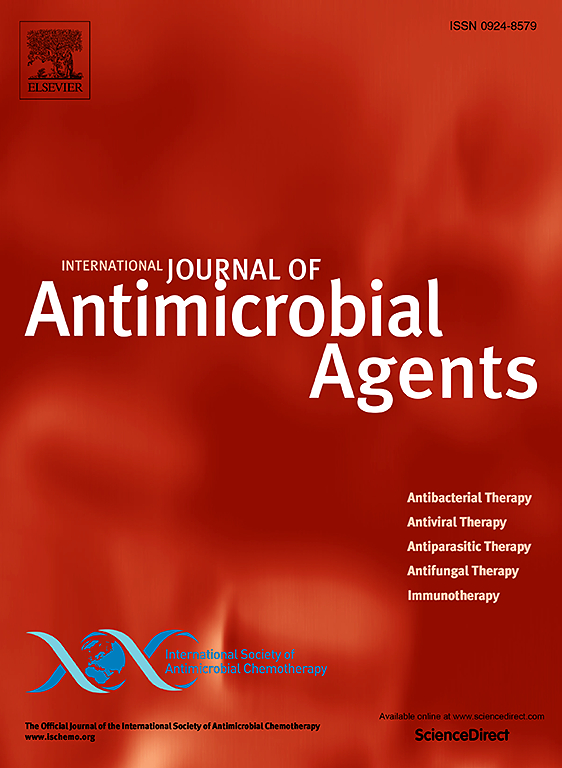Prophylactic phage aerosols for nosocomial infection control in an extracorporeal membrane oxygenation unit: A 4-year prospective study of temporospatially designed phage cocktails
IF 4.9
2区 医学
Q1 INFECTIOUS DISEASES
International Journal of Antimicrobial Agents
Pub Date : 2025-02-01
DOI:10.1016/j.ijantimicag.2024.107413
引用次数: 0
Abstract
Phage-based decontamination has rarely been explored in real-world settings, particularly in the environments of patients undergoing extracorporeal membrane oxygenation (ECMO). This four-year prospective study aimed to evaluate the effectiveness of aerosolized phage cocktails tailored to combat target antibiotic-resistant species of Acinetobacter baumannii, Klebsiella pneumoniae, Pseudomonas aeruginosa, and Stenotrophomonas maltophilia. The decontamination procedure with phage aerosols was proactively implemented before the admission of ECMO patients based on a thorough analysis of phage typing results from bacterial species isolated from prospective patient areas during the preceding two months. The phage cocktail formulation design also accounted for phage resistance development, phage families, and plaque characteristics. Throughout the study, 85 ECMO patients were monitored, with the environments of 22 patients undergoing phage decontamination. Fifty phage cocktails were prepared to target the identified species. Respiratory infections were most common among ECMO patients, accounting for 71.4 %. The ECMO duration for patients infected with the targeted species was significantly longer than that for noninfected patients (P = 0.019), with peak infection incidence occurring between 3 and 7 days of ECMO treatment (67.1 per 1000 ECMO days). Notably, none of the patients in phage-treated environments contracted infections from the targeted species. However, the overall incidence of bacterial infections did not significantly correlate with phage decontamination efforts, as phages are effective only against their specific hosts. This study demonstrates the potential of prophylactic phage decontamination to prevent specific infections, aligning with One Health principles by offering a sustainable alternative to antibiotics, potentially significantly reducing antibiotic use.
预防性噬菌体气雾剂用于体外膜氧合装置的医院感染控制:时空设计噬菌体鸡尾酒的4年前瞻性研究。
基于噬菌体的去污很少在现实环境中进行探索,特别是在接受体外膜氧合(ECMO)的患者环境中。这项为期四年的前瞻性研究旨在评估雾化噬菌体鸡尾酒对抗鲍曼不动杆菌、肺炎克雷伯菌、铜绿假单胞菌和嗜麦芽窄养单胞菌等耐药靶标物种的有效性。基于对前两个月从预期患者区域分离的细菌种类的噬菌体分型结果的彻底分析,在ECMO患者入院前主动实施了噬菌体气雾剂去污程序。噬菌体鸡尾酒配方设计还考虑了噬菌体耐药性的发展、噬菌体家族和斑块特征。在整个研究过程中,监测了85例ECMO患者,其中22例患者的环境进行了噬菌体净化。准备了50个噬菌体鸡尾酒来针对鉴定的物种。呼吸道感染在ECMO患者中最为常见,占71.4%。靶菌感染患者的ECMO持续时间明显长于未感染患者(p = 0.019),感染高峰发生在ECMO治疗的3-7天(67.1 / 1000 ECMO天)。值得注意的是,在噬菌体治疗的环境中,没有患者感染目标物种的感染。然而,细菌感染的总体发生率与噬菌体去污工作没有显著相关性,因为噬菌体仅对其特定宿主有效。这项研究证明了预防性噬菌体去污在预防特定感染方面的潜力,通过提供一种可持续的抗生素替代品,与“同一个健康”原则保持一致,有可能显著减少抗生素的使用。
本文章由计算机程序翻译,如有差异,请以英文原文为准。
求助全文
约1分钟内获得全文
求助全文
来源期刊
CiteScore
21.60
自引率
0.90%
发文量
176
审稿时长
36 days
期刊介绍:
The International Journal of Antimicrobial Agents is a peer-reviewed publication offering comprehensive and current reference information on the physical, pharmacological, in vitro, and clinical properties of individual antimicrobial agents, covering antiviral, antiparasitic, antibacterial, and antifungal agents. The journal not only communicates new trends and developments through authoritative review articles but also addresses the critical issue of antimicrobial resistance, both in hospital and community settings. Published content includes solicited reviews by leading experts and high-quality original research papers in the specified fields.

 求助内容:
求助内容: 应助结果提醒方式:
应助结果提醒方式:


